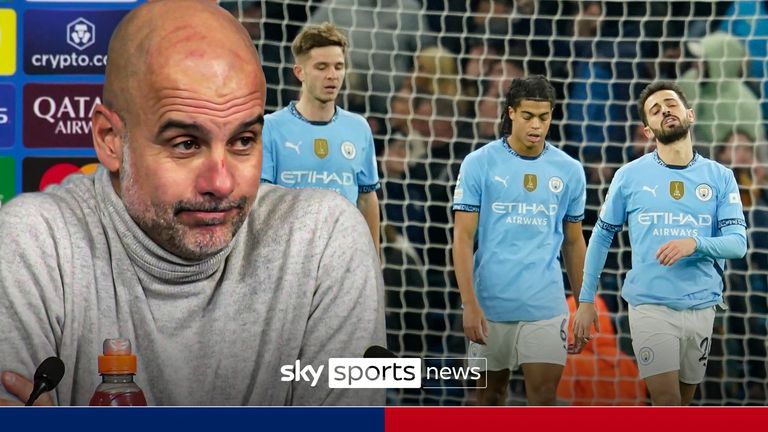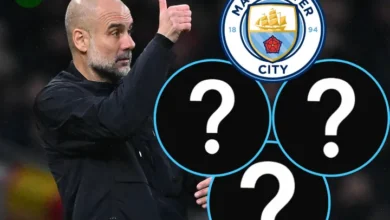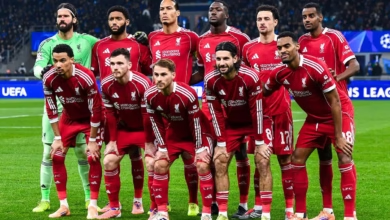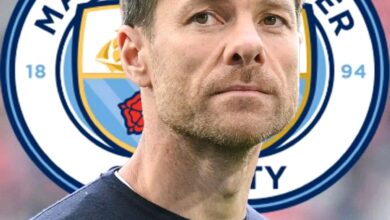Man City star bids emotional farewell as Manchester City star’s exit confirmed

The world of professional football often celebrates the goal scorers, the playmakers, and the match winners. Rarely does it pause to acknowledge the quiet influences, the mentors who never see the spotlight, or the seasoned professionals who contribute far beyond what statistics can measure. Scott Carson’s departure from Manchester City after six years represents the end of one such understated but profoundly important chapter in the club’s recent history.
At 39 years old, Carson’s exit from the Etihad Stadium might seem like a footnote in Manchester City’s continuing evolution under Pep Guardiola. After all, the veteran goalkeeper made just two appearances during his entire tenure with the club, logging merely 108 minutes of competitive football. Yet the emotional tribute from Erling Haaland and the club’s official statement reveal a story that transcends mere playing time—a testament to the immeasurable value of experience, leadership, and character in professional sport.
The Role of the Third-Choice Goalkeeper
To understand Scott Carson’s significance at Manchester City, one must first appreciate the unique position of a third-choice goalkeeper in modern football. Unlike outfield players who might rotate through various competitions or come on as substitutes, backup goalkeepers—particularly those third in the pecking order—face the psychological challenge of remaining match-ready while knowing their opportunities will be severely limited.
Carson’s role at City extended far beyond the traditional expectations of a goalkeeper. While Ederson established himself as the undisputed number one and Stefan Ortega Moreno served as a capable deputy, Carson occupied a position that modern football has come to recognize as crucial: the experienced mentor who bridges the gap between playing staff and coaching personnel.
This role has evolved significantly in contemporary football. Clubs now understand that having a seasoned professional who can guide younger players, maintain squad morale during difficult periods, and provide tactical insight based on years of top-level experience is invaluable. Carson embodied this role perfectly during his time at Manchester City.
From England International to City Mentor
Carson’s journey to Manchester City was far from conventional. His career trajectory tells the story of a goalkeeper who experienced the highest highs and lowest lows that professional football can offer. An England international with four caps to his name, Carson’s career was marked by moments of brilliance overshadowed by a few high-profile errors that football fans with long memories will never forget.
The most notorious of these came during England’s Euro 2008 qualifying campaign against Croatia. On a waterlogged Wembley pitch in October 2007, Carson’s mistake contributed to a 3-2 defeat that ultimately ended Steve McClaren’s tenure as England manager and prevented the national team from qualifying for the European Championships. It was a moment that could have defined and destroyed a lesser character.
Instead, Carson’s response to that setback revealed the mental fortitude that would later make him such a valuable presence at Manchester City. Rather than allowing the criticism to derail his career, he continued to perform at the highest level, representing clubs like Aston Villa, West Bromwich Albion, and even venturing abroad to Turkey with Bursaspor.
By the time he arrived at Manchester City in 2019, Carson brought with him not just technical ability, but a wealth of experience in handling pressure, dealing with setbacks, and maintaining professionalism in challenging circumstances. These qualities proved invaluable in a dressing room filled with young, ambitious players navigating the pressures of playing for one of world football’s most successful clubs.
The Guardiola Era and Carson’s Integration
Pep Guardiola’s Manchester City is renowned for its tactical sophistication, relentless pursuit of perfection, and demanding training environment. For a player like Carson, joining such a setup in the twilight of his career could have been intimidating. Instead, he embraced the challenge and found ways to contribute that went beyond his designated role.
Guardiola has always valued intelligence and professionalism in his squads, often keeping older players specifically for their leadership qualities and tactical understanding. Carson fit this profile perfectly. His experience allowed him to serve as an unofficial liaison between the coaching staff and players, helping to translate Guardiola’s complex tactical instructions and maintaining squad harmony during intense periods.
The Spanish manager’s trust in Carson was evident in his decision to keep him for six seasons—an eternity in modern football for a player with such limited playing opportunities. This longevity speaks to Carson’s professionalism and the intangible benefits he brought to the squad.
The Impact on Squad Dynamics
Carson’s influence on Manchester City’s squad dynamics cannot be understated. In a team filled with international stars and young talents, having a calm, experienced presence proved invaluable. His role was particularly important during the club’s most successful period, when the pressure of maintaining excellence could have overwhelmed less experienced squad members.
The praise from goalkeeping coach Xabi Mancisidor and fellow goalkeepers Ederson and Stefan Ortega Moreno highlights Carson’s professional approach. In a position where competition can breed resentment, Carson fostered an environment of mutual support and learning. His willingness to share knowledge and experience with his younger colleagues exemplified the selfless attitude that championship teams require.
This dynamic was particularly crucial during Manchester City’s historic treble-winning season and subsequent achievements. While Carson may not have featured prominently in match situations, his contribution to maintaining squad morale and providing guidance during pressure moments was significant.
Erling Haaland’s Tribute: A Window into Squad Relationships
Perhaps no gesture better illustrates Carson’s impact than Erling Haaland’s emotional tribute on Instagram. The Norwegian striker’s post, featuring photos of the two together and the caption “The kind of teammate every squad needs. All the best in the new chapter @scottpcarson33!” provides insight into the relationships that exist beyond public view.
Haaland, despite his young age and meteoric rise to football stardom, recognized the value of Carson’s presence. This acknowledgment from one of world football’s brightest talents speaks volumes about Carson’s character and influence. In an era where social media tributes can feel perfunctory, Haaland’s message carried genuine warmth and respect.
The striker’s tribute also highlights an important aspect of modern football culture: the recognition that success requires contributions from every member of the squad, regardless of playing time. Haaland’s willingness to publicly acknowledge Carson’s influence demonstrates the maturity and team-first mentality that has characterized Manchester City’s recent success.
The Evolution of Squad Depth in Modern Football
Carson’s career at Manchester City coincided with the evolution of squad depth in elite football. Modern clubs maintain larger squads than ever before, with players accepting limited playing time in exchange for being part of successful projects. This shift has created new roles and expectations within team structures.
The third-choice goalkeeper position has become particularly important in this context. Unlike previous generations where such players might have been considered surplus to requirements, clubs now recognize the value of having experienced professionals who can contribute in various ways. Carson’s tenure at City exemplifies this evolution.
His presence allowed the club to maintain continuity and stability in the goalkeeping department while providing a safety net that went beyond mere emergency cover. The psychological comfort of having a seasoned professional available, combined with his mentorship qualities, created value that extended throughout the squad.
A Historic Period of Success
Carson’s six years at Manchester City coincided with one of the most successful periods in the club’s history. During his tenure, City won the Premier League four times, along with the FA Cup, Carabao Cup, Champions League, and Club World Cup. While his direct contribution to these victories was minimal in terms of playing time, his role in maintaining squad cohesion and professionalism during this period was significant.
The achievement of being part of eleven major trophy wins represents a remarkable period of sustained excellence. For Carson, these victories validated his decision to accept a reduced playing role in favor of contributing to something larger than individual glory. His willingness to prioritize team success over personal statistics exemplifies the mentality required for sustained success at the highest level.
The Changing Landscape of Career Longevity
Carson’s career also reflects broader changes in how professional footballers approach career longevity. Modern sports science, improved fitness regimens, and better understanding of player development have extended careers significantly. At 39, Carson remained physically capable of performing at the highest level, demonstrating the benefits of professional dedication and modern training methods.
His career trajectory also highlights the importance of adaptability in professional sports. Rather than struggling against the reality of reduced playing opportunities, Carson embraced his evolving role and found new ways to contribute. This adaptability allowed him to extend his career and remain relevant in an increasingly competitive environment.
Lessons in Professionalism and Character
Perhaps Carson’s greatest legacy at Manchester City lies in the example he set for professionalism and character. In an era where player attitudes and commitment levels are constantly scrutinized, Carson provided a masterclass in how to conduct oneself with dignity regardless of circumstances.
His approach to training, his interactions with teammates, and his public demeanor consistently reflected the highest standards of professionalism. These qualities, while not quantifiable in traditional metrics, contributed significantly to the positive culture that has underpinned Manchester City’s success.
Young players in the squad would have observed Carson’s approach and learned valuable lessons about resilience, professionalism, and finding ways to contribute regardless of playing time. These lessons extend far beyond football and represent life skills that will serve them throughout their careers.
The Broader Context of Squad Harmony
Carson’s departure comes at a time when Manchester City faces significant changes to their squad composition. The exit of Kevin De Bruyne and the uncertainty surrounding players like Jack Grealish represents a transitional period for the club. In this context, losing a stabilizing influence like Carson represents more than just the departure of a backup goalkeeper.
Squad harmony becomes increasingly important during periods of transition. Carson’s ability to maintain positive relationships across all levels of the organization provided stability that will be difficult to replace. His departure removes a valuable voice of experience at a time when the club may need such guidance most.
Looking Forward: Carson’s Next Chapter
As Carson embarks on the next phase of his career, his experience at Manchester City will undoubtedly influence his future endeavors. Whether he continues playing, moves into coaching, or pursues other opportunities within football, the lessons learned and relationships built during his time at the Etihad will prove invaluable.
His tenure at City also demonstrates that there are multiple pathways to success in professional football. While goal scorers and playmakers receive the headlines, Carson’s story illustrates that meaningful contributions can come in many forms. His legacy serves as an inspiration for players who may not always be in the spotlight but who understand their role in larger success stories.
The Lasting Impact
Scott Carson’s departure from Manchester City marks the end of an era that, while quiet, was profoundly meaningful. His six-year tenure represented far more than the sum of his playing statistics. Through professionalism, mentorship, and unwavering commitment to team success, Carson embodied the qualities that championship organizations require.
Erling Haaland’s tribute captured the essence of Carson’s contribution: he was indeed “the kind of teammate every squad needs.” As Manchester City continues its pursuit of excellence, the standards set by Carson’s professionalism and character will remain part of the club’s cultural foundation.
The goalkeeper may be leaving, but his influence on the players who remain, the lessons he taught through example, and the standards he maintained will continue to resonate throughout the organization. In a sport often defined by individual brilliance, Scott Carson’s story reminds us that true success requires contributions from every member of the team, regardless of the spotlight’s glare.
His legacy at Manchester City proves that greatness can be measured not only in goals scored or saves made, but in the positive influence one person can have on others’ lives and careers. As he moves forward to his next chapter, Carson does so having left an indelible mark on one of football’s most successful clubs—a testament to character, professionalism, and the power of finding purpose beyond personal glory.















